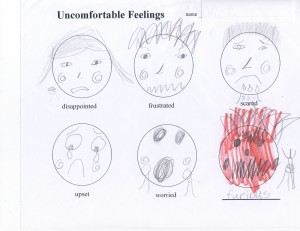|
|
January 7, 2015
 “Why did you make this for dinner!” When children reach a certain age, they will, if we’ve encouraged them to do so, voice their opinions. That’s very healthy and should be encouraged. But sometimes this opinion-sharing turns into a constant barrage of complaints. That can pollute family life. So tell the truth, do your kids complain a lot?
Some folks look at protestors as “complainers.” I disagree. The goal of well-intentioned protestors is to work for more equality, justice, safety, and sanity in the world. All good things, right? That’s why we need our protestors and should join them whenever we feel the urge to support a cause. Complainers, on the other hand, are typically motivated by ego and jealousy. We don’t need more of that.
The following is an excerpt from my book Teaching Kids To Be Good People. If you’d like less complaining from your kids this year, read on…
There is an important concept at the foundation of Jewish tradition known as tikkun olam (repairing the world). It refers to going out of one’s way to make things better for others. Good people are doers, repairers of the world. Complainers have a lot of negative things to say, but they are rarely people of positive action. Making our children more aware of complaining vs. helping encourages them to do good.
Fuel for Thought—When you personally feel something isn’t OK, how do you usually respond? Are you more likely to take direct action or complain? Remember that you are modeling for your children the behavior you want to see in them. Think about the people you know who are (or were) “complainers”? What is it like to be with those people? How is your mood and attitude affected by being around a complainer vs. someone who addresses problems with a positive attitude?
Conversations That Count—Talk with your child about the amount of complaining in the family. (No need to single out any individual, because we all do it at times.) Some complaints point to things can be changed. but most complaints aren’t helpful because they refer to situations that can’t be changed. (“This math assignment is too long!” “Why did I get her for a sister?”) Ask your child to “play back” complaints s/he regularly hears from you. Then you play back complaints you regularly hear from your child. (It’s fine to get silly. Humor is a great way to make it easier to speak the truth.) How much of the grumbling and whining amongst family members has become a bad habit with no real intention toward making things better? What might the family do about that?
Teach—Assuming everyone wants less complaining/nagging, challenge each member of the family to catch himself/ herself (not anyone else) in the act of complaining. Instead of complaining about someone or something:
- Communicate directly about what needs to be done.
- Skip the complaining, and do some or all of whatneeds to be done (on your own).
- Change what you can change, and change yourattitude about the rest.
Have a family meeting next week to discuss the progress the whole family has made in creating a more positive atmosphere.
As always, your comments are warmly welcomed on this blog. Happy New Year!

July 28, 2014
 Feeling uncomfortable? Now use it for good. As we approach the beginning of the new school year, my heart goes out to the kids who are dreading it. They are usually the ones who had to wade through more than their share of social garbage last term. Hopefully they got a needed reprieve during the summer. But they’ve got to go back and most of them (and their parents and teachers) are probably not looking forward to the inevitable crapola (online and off).
Being in the prevention business, I’m always working on ways to make schools more compassionate. Here’s my latest contribution… just a reminder… adapted from the Charter for Compassion’s call to action for cities.
A compassionate school is an uncomfortable school!
Uncomfortable when anyone is threatened, harassed, or made to feel less than.
Uncomfortable when every child isn’t treated with respect by every teacher and every other student.
Uncomfortable when every student isn’t given rich opportunities to grow intellectually, creatively, and emotionally.
Uncomfortable when, as a school community, we don’t treat each other as we want to be treated.
A compassionate school knows uncomfortable feelings aren’t worth zippo, if they don’t trigger action. So a compassionate school recognizes the discomfort and immediately works for change with the full leadership and commitment of all administrators and teachers. With adult leadership, students learn how they too can become change agents. Because, whether students admit it or not, they desperately want their school to be a place where every kid is treated with respect. Every one.
Got it? Good. Now go make your kid’s school really uncomfortable. We’re in this together.

May 14, 2014
 Let me try to make it better Unless this is your first visit here, you know I’m all about teaching kids to be good people. What form of “goodness” am I after? Who cares? Good is good. Let’s not quibble.
If I had to choose one flavor of goodness over another, however, I’d say I’m partial to the kind that connects us to the suffering of others with a grip so powerful that we simply cannot resist the temptation to do something to try to make the other guy feel better. This is compassion. Not complicated and yet, in many homes, schools, city streets, compassion seems to be MIA. Why is that? I’ve got a theory. (Unless this is your first visit, you also know I’m very generous with my theories.)
OK, here’s how it works: Within me (and each of you) is a vat overflowing with opinions, assumptions, fears and all the rest of what I secretly stockpile and use to avoid doing the right thing, which is often a scary thing but at the same time, a good thing. Submerged under the fearsome muck lies a luminous pearl. When you pull the plug and let the bubbling crude drain out of the vat, (which just takes an instant because the conscious act of pulling the plug awakens you to the fact that while your inventory is er… interesting, it’s not really you at all) the pearl emerges and vaporizes your resistance to acting compassionately. Which is a helluva lot more helpful than sitting on your butt and simply feeling compassionate.
Speaking of compassionate acts, I’m reading Glennon Melton’s book Carry on, Warrior. (Great writing. Great book. Read it!) When I came to this part in which Glennon writes a letter to her son preparing him for the social garbage he might encounter in 3rd grade, I stopped and smiled. See if it doesn’t have the same effect on you:
“Compassion might lead you to tell a teaser to stop it and then ask the teased kid to play. You might invite a left-out kid to sit next to you at lunch. You might choose a kid for your team first who usually gets chosen last. These things will be hard to do, but you can do hard things.”
Yep. We can do hard things that help each other. Lucky we have this ability because this trip we’re all on is hard. If it was easy (were easy… thank you, Mom) they’d call it a Day at the Beach. Instead they call it LIFE. So keep your hand on the plug and apply compassion as needed.

May 2, 2014
 I’ve got you, sweetie. I had a great dad. Unfortunately, he died of a massive heart attack when I was 15. After that, and for a very long time, I had a massive case of “dad hunger.” So there’s no surprise I was immediately drawn to Keith Zafren’s book How to Be a Great Dad – No Matter What Kind of Father You Had. Right there, in his introduction, he talks about his own “father hunger” and personal journey of healing.
Keith is the founder of The Great Dads Project. He and I connected on Twitter (as so many do) and we swapped books. He was kind enough to write a blog about my work and a separate review of my book, Teaching Kids to Be Good People.
In turn, I read How To Be a Great Dad and interviewed Keith for my weekly podcast Family Confidential. We had a heart-to-heart conversation about how much kids benefit from having a loving, engaged, committed dad in their lives and what they sorely miss when they don’t. We also talked about practical ways in which women can encourage their men to be better dads. The interview really touched me.
Please listen to my conversation with Keith Zafren on this week’s Family Confidential podcast. Share it with the dads you know, as well as the moms. It will help kids everywhere.
 — Older Posts »
| |















